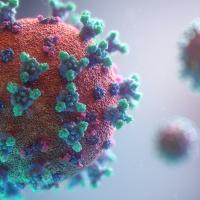
The Omicron variant of SARS-COV2 is currently predominant variant spreading throughout the US.
Symptoms of Omicron
While many patients have reported milder symptoms compared to the Delta variant, Omicron is still a variant of concern and could cause illness. Symptoms may appear 2-14 days after exposure to the virus. Common symptoms include (but are not limited to):
- Fever and/or chills
- Cough
- Shortness of breath
- Difficulty breathing
- Muscle and/or body aches
- Headache
- Congestion
- Runny nose
- Sore throat
- Diarrhea
- Nausea or vomiting
Loss of taste and smell are not as common with Omicron as with previous variants.
While we are still learning important details about the rapidly spreading variant, there are proven safety strategies you can apply to best protect yourself.
Vaccines
According to the CDC, current vaccines can protect against severe illness, hospitalizations, and deaths due to infection of Omicron. Individuals who have received their have an extra layer of protection against severe illness. Please note, while it has been widely seen that boosters have increased immunity, there have been breakthrough cases in individuals who have received their booster shots.
Masks
Masks offer protection against all variants of COVID-19. Respirators such as KN95, N95 or KF94 provide the best protection, however surgical and cloth masks provide a barrier from germs. It is recommended that you wear a mask when indoors, and in close proximity to others. If you don’t have access to a respirator, cloth and disposable masks are better than no mask at all!
For more information on the types of masks and to help you make an informed decision on what masks you should wear, visit https://www.cdc.gov/coronavirus/2019-ncov/prevent-getting-sick/types-of-masks.html
Testing
Tests are the definitive way to determine if you have been infected with COVID. PCR tests are considered the gold standard but antigen tests, such as the kind you can test at home, are effective in detecting active virus.
GRMDC offers rapid and PCR testing by appointment. Please call 617-323-4440 to schedule your testing appointment. Local pharmacies offer antigen tests to use at home, or you can contact your insurance provider to get more information about obtaining tests from them.
Please note, a positive antigen (at-home) test generally means you are COVID positive, therefore there is no need to take a PCR test to confirm your positive status (unless you need proof for work, school, etc.). You should take proper isolation measures and follow the CDC recommended quarantine guidelines.
Per the recent White House policy, as of January 15, 2022, individuals covered by a health insurance plan who purchase an over the counter at-home antigen test authorized by the FDA will be able to have costs covered by insurance plans. For more information, visit the US Department of Health and Human Service’s announcement here.
For more information, visit the CDC COVID-19 Viral Testing Tool
Finally, we understand that COVID fatigue is a common feeling. We have been practicing social distancing and dealing with rapidly changing information about this virus for almost two years. However, while many people have experienced mild symptoms from Omicron, it is strongly recommended that you still do your best to avoid becoming infected with the virus as it still can be dangerous.
